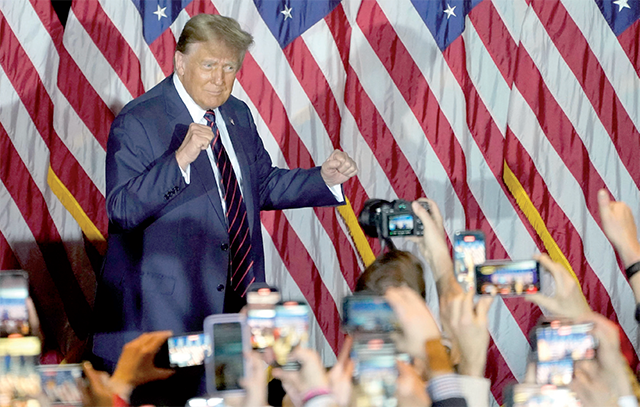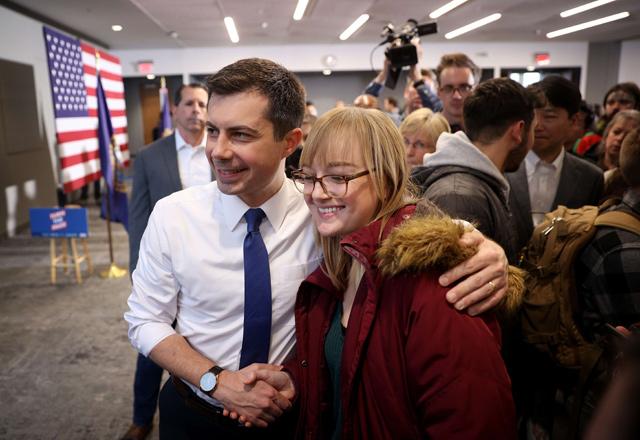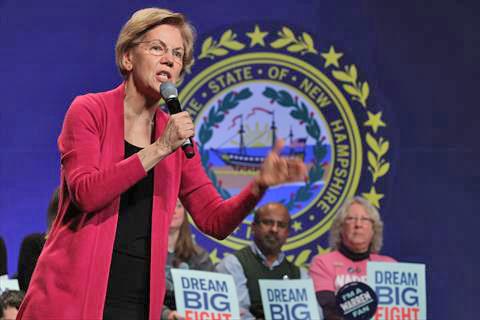You are here
For some Republicans, a Trump victory looks increasingly possible
By Reuters - Aug 06,2015 - Last updated at Aug 06,2015
CLEVELAND — Four years ago, only one Republican candidate was consistently hitting the same kind of polling heights among the presidential field that real estate mogul Donald Trump is reaching now. His name was Mitt Romney.
The fact that Romney went on to capture his party's nomination should be, at the very least, one basic reason why Trump's recent surge can't be dismissed as the aberration that so many pundits and party strategists claim it is.
That doesn't mean, of course, that Trump, who will command centre stage at the first Republican presidential debate on Thursday, is going to wind up the party's nominee a year from now. There are significant obstacles in his path: his history of supporting liberal causes, his sclerotic campaign organisation and his limited appeal — so far — to a narrow swath of Republican voters.
Still, some Republicans, especially those outside of Washington, are urging the party to take Trump's bid seriously, arguing that it's not out of the question that he could shock the world and win the primary.
Craig Robinson, the former chairman of the Iowa Republican Party, sees echoes of the current president in Trump's run, saying Trump is another product of the media environment.
"Obama was a brand. Donald Trump is a brand. At the end of the day it was really cool to be an Obama supporter and really uncool to be a McCain or Romney supporter," said Robinson, who is neutral in the Republican primary.
Steve Deace, an influential conservative radio host in Iowa, said those within the Republican Party who are dismissing Trump's chances of securing the Republican presidential nomination "are underestimating just how fed up the base is with the feckless actions of this political party".
Trump, who has made incendiary comments about Mexican immigrants, is dominating polls that suggest he is riding a wave of anti-immigrant and anti-establishment fervour. The big question is whether he can ride that wave all the way to the Republican nominating convention in Cleveland, Ohio, in July 2016.
Room to grow
To do that, "he's going to need to do one of the harder things in politics — bring scores of new voters into the primary voting process," Deace said.
That's because, while Trump's support within the party at the moment appears to be relatively substantial compared to the rest of the presidential field, it is also limited.
He attracts male voters who are less educated, less affluent and less religious than the Republican electorate as a whole, according to a Reuters/Ipsos survey of almost 2,000 Republicans conducted last month.
It showed 61 per cent of Trump supporters to be male and almost half of those surveyed in the poll said they weren't religious. Over half had not attended college and almost 20 per cent earned less than $50,000 a year.
To win the nomination, Trump would need to widen his appeal by attracting social conservatives in greater numbers than he's doing now as well as more upscale, college-educated voters and women voters.
To that end, Trump is showing signs of wanting to be more than a celebrity contender. Slowly, he's beginning to build organisations in the key early primary states of Iowa and New Hampshire to compete for voters.
In Iowa, Trump has hired Chuck Laudner, a well respected operative who in 2012 worked for the underfunded and little-known Rick Santorum, the candidate who shocked the national political scene by tying Romney in the caucuses.
A religious conservative, Laudner signing on with Trump was viewed by some in Iowa as a surprise and it could mean that Trump will be able to expand his base of support. Last month, Trump raised eyebrows when he told an Iowa audience that he had never sought forgiveness from God for anything.
"I don't bring God into that picture. I don't," Trump said.
"Chuck Laudner's a true believer in the Christian right," said Douglas Gross, a Republican strategist in Iowa. "Ideologically, [he and Trump] couldn't be farther apart."
In New Hampshire, Trump already has a chairman in each county in the state.
"I've been part of campaigns for the past 20 years in New Hampshire, and I'm seeing all the right things being done to put him in a very good position for the primary," said Lou Garguilo, a county co-chair for Trump.
Of the candidate's appeal, Garguilo said, "What I love about him is he's a successful businessman who's built a very large business. He speaks plainly, He talks about issues that are of grave concern to many of us, things like healthcare, border security, China."
Most important, "He tells it like it is," Garguilo said.
Striking a chord
There's little doubt that Trump has tapped into a segment of the party that is concerned about immigration, trade, outsourcing and the erosion of middle-class jobs in the United States.
Another successful businessman, Ross Perot, voiced similar concerns. In his independent bid for president in 1992, he secured 19 per cent of the vote. His presence helped define the issues in the race.
Trump is doing something similar for the Republicans. "Right now, this election is about immigration," said Vincent DeVito, a Republican election lawyer and strategist who worked for Romney in 2012. "Donald Trump made it about immigration."
Trump's anti-establishment appeal and his contempt for party orthodoxy are also seen as drawcards for many voters frustrated by a political elite they see as disconnected from the issues that matter most to middle class Americans.
In a CBS News poll released this week, Trump scored the highest among Republican candidates (30 per cent) with voters who said they were angry at Washington.
"The environment is ripe for anti-Washington, anti-politician candidacy. The more the Republican establishment circles the wagons, the more people are attracted to him," said Joe Trippi, the strategist who helped engineer Democrat Howard Dean's insurgent presidential bid in 2004.
Trippi said that the large Republican field — there are 17 declared candidates — could work to Trump's advantage, meaning he would need a smaller share of the Republican electorate to win primaries.
"However improbable it is that Trump emerges as the nominee, I would not bet against him," Trippi said. "He can win states with 25 per cent or 30 per cent of the vote."
All of it is easier said than done. That same CBS News poll showed Trump to have the highest negative ratings of any Republican in the field.
There have been other recent celebrity candidate flameouts. Eight years ago, the contenders who were leading the national polls during the summer of 2007 were Rudolph Giuliani, the ex-New York mayor, and Fred Thompson, the former star of TV's "Law and Order".
Both were gone from the race within six months.
Related Articles
MANCHESTER, United States — Donald Trump won the key New Hampshire primary on Tuesday, moving him ever closer to locking in the Republican p
MEREDITH, United States — Even out on ice-covered Lake Winnipesaukee the talk turns to politics, as voters in tiny New Hampshire, which play
WASHINGTON, United States — Democratic candidates were anxiously awaiting results from the Iowa caucuses on Tuesday after technical glitches



















